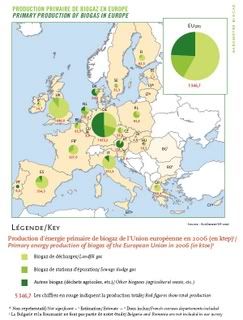Denmark opens world's largest experimental biogas complex to research biomass feedstocks, processes, logistics
 The world’s largest experimental biogas complex was inaugurated last month in Denmark at the Aarhus University's Faculty of Agricultural Sciences. Research at the new reactors, which are situated at the faculty's Research Centre Foulum, will improve the utilisation of biogas and the effect of agricultural production on the climate and the environment. The project is financed by Denmark's Ministry of Food, Agriculture and Fisheries.
The world’s largest experimental biogas complex was inaugurated last month in Denmark at the Aarhus University's Faculty of Agricultural Sciences. Research at the new reactors, which are situated at the faculty's Research Centre Foulum, will improve the utilisation of biogas and the effect of agricultural production on the climate and the environment. The project is financed by Denmark's Ministry of Food, Agriculture and Fisheries.According to the researchers, there is great potential in increasing the Danish production of biogas. Biogas replaces fossil fuels and reduces the emissions of greenhouse gases. Increased biogas production will make it possible for Denmark to meet its international climate obligations.
Our ambition is that the new biogas plant will contribute to bringing Denmark to the global forefront in the area of [research into] consumption of energy and nutrients from animal manure and other types of biomass. - Minister of Agriculture Eva Kjer HansenThe new facilities consist of four experimental reactors each with their own holding tanks as well as a dosage system for adding different feeds of solid material such as leftover animal feed, deep straw manure, energy crops and other biomass materials. The plant will therefore be one of the most advanced and flexible experimental biogas plants in the world.
Apart from the experimental reactors, a full-fledged production plant was taken into operation as well. This anaerobic digestion facility will treat approximately 29,000 tonnes slurry and 2,000 tonnes biomass from the barns and fields at Foulum. On this basis the plant will be able to produce about 850,000 cubic metres methane gas, which will be utilised for heat and electricity at the local thermal power station.
Feedstocks, nutrients, production processes
In Denmark, biogas production will be based on animal production and sustainably harvested biomass. When animal manure is treated in a biogas plant, leaching of nutrients to the aquatic environment is reduced as are odour problems as less slurry is spread on fields.Waste products, which would otherwise be expensive to get rid of, enter into biogas production.
Biomass from natural areas such as meadows will also be included in biogas production. That way undesirable nutrients are removed from natural areas and production of biogas can contribute to the management of caring for natural areas that in turn have an added value as suppliers of renewable energy. There are approximately 500,000 hectares of lowlands in Denmark the biomass of which should be harvested to limit damage from excess nutrients.
According to a recent EU Biogas Barometer, Denmark leads in developing biogas technologies for co-digestion of different biomass materials (previous post). The new research reactors will make it possible to further develop this line of research:
 energy :: sustainability :: biomass :: bioenergy :: biofuels :: biogas :: biomethane :: anaerobic digestion :: Denmark ::
energy :: sustainability :: biomass :: bioenergy :: biofuels :: biogas :: biomethane :: anaerobic digestion :: Denmark :: However, there is still a long way to go before the full potential of biogas is realized. In existing biogas plants turnover of organic material from, for example, animal manure and straw is still only 50-60 percent of what is theoretically possible.
There are many proposals for methods to improve biogas production. However, scientific documentation and testing of the methods under practical conditions is often lacking. The new experimental biogas plant at Research Centre Foulum will change that. The new plant, which is financed by the Ministry of Food, Agriculture and Fisheries, will provide scientists, students and biogas producers with new opportunities to develop and test methods and technologies on a large scale. The new plant is the world’s largest experimental biogas plant.
Besides carrying out research that can optimise the processes in the actual biogas reactor, it will also be possible to do experiments in the various parts of the biogas supply chain.
The location at Research Centre Foulum gives access to an extensive choice of raw materials from the centre’s herds of dairy cattle, pigs, poultry and mink. The centre can also supply energy crops, straw and other types of biomass.
We expect the various technological ideas that will be tested at DJF’s new biogas plant will contribute to making future biogas plants more efficient and reliable, improve their economy and achieve a greater environmental bonus compared to the first generations of biogas plants. - Gunnar Hald Mikkelsen, Head of the Department of Research Facilities at the Faculty of Agricultural Sciences, University of AarhusBackground
 When biomethane is produced from dedicated energy crops, it can yield more energy than any other current type of biofuel. The green gas can be made from a very wide range of biomass crops as well as from abundant crop residues. Scientists have found [*.pdf] that for temperate grass species, one hectare can yield between 2,900–5,400 cubic meters of methane per year, enough to fuel a passenger car for 40,000 to 60,000 kilometers (one acre of crops can power a car for 10,000 to 15,000 miles).
When biomethane is produced from dedicated energy crops, it can yield more energy than any other current type of biofuel. The green gas can be made from a very wide range of biomass crops as well as from abundant crop residues. Scientists have found [*.pdf] that for temperate grass species, one hectare can yield between 2,900–5,400 cubic meters of methane per year, enough to fuel a passenger car for 40,000 to 60,000 kilometers (one acre of crops can power a car for 10,000 to 15,000 miles).A recent 'Biogas Barometer' report, published by a consortium of renewable energy groups led by France's Observ'ER, cites a 13.6% increase growth in biogas use for primary energy production between 2005 and 2006 in the EU (earlier post).
According to the barometer, Denmark produced around 94,200 tonnes of oil equivalent biogas in 2006, mainly from agricultural waste (map, click to enlarge).
Codigestion is a Danish specialty. The country's production primarily comes from 20 codigestion units and small-scale farm production units (60%), that are far more advanced than biogas produced from rubbish dumps (15%) and sewage purification plants (25%). Biogas based combined heat and power plants running on biogas have been particularly developed in Denmark and are at the origin of practically all of the biogas-based electricity produced in the country. Denmark is, moreover, the fourth biggest EU country in terms of biogas production if primary energy production per inhabitant (with 17.4 toe per 1 000 inhabitants) is taken into consideration.
The total energy potential for biogas in the EU has been the subject of several projections and scenarios, with the most optimistic showing that it can replace all European natural gas imports from Russia by 2020 (more here). Germany recently started looking at opening its main natural gas pipelines to feed in the renewable green gas. And an EU project is assessing the technical feasibility of doing the same on a Europe-wide scale (previous post).
Biogas as a transport fuel offers particularly interesting prospects for the developing world, where oil infrastructures are not yet developed extensively. By relying on locally produced biomethane used in CNG cars, these countries could leapfrog into a clean, secure and green post-oil future (previous post).
The Research Centre Foulum is the largest unit under the Danish Institute of Agricultural Sciences (DIAS). The majority of the research in animal husbandry and plant production is carried out at Foulum. Furthermore, Foulum carries out a large part of the interdisciplinary research, i.e. ecology, animal husbandry production and welfare.
In the area of animal husbandry the facilities include livestock buldings, livestock/herds, a foodstuff factory and a slaughterhouse. Research into cattle, pigs, mink, sheep and poultry is emphasized. The area of plant production include facilities for experimental cultivation as well as research in applied cropping systems and specialized facilities. The Research Centre Foulum disposes of a built up area of approx. 100,000 m2 and 550 hectares of land.
For comprehensive overviews of the latest developments in biogas research, development and applications across Europe, please search the Biopact website.
Picture: The Research Centre Foulum, Denmark's leading animal husbandry and plant production research institution. Credit: Aarhus University.
References:
Aarhus Univeristy, Faculty of Agricultural Sciences: Biogas for renewable energy and a better environment - November 1, 2007.
Biopact: Study: EU biogas production grew 13.6% in 2006, holds large potential - July 24, 2007
Biopact: Experts see 2007 as the year of biogas; biomethane as a transport fuel - January 09, 2007
 --------------
--------------
 South Korea plans to invest 20 billion won (€14.8/$21.8 million) by 2010 on securing technologies to develop synthetic fuels from biomass, coal and natural gas, as well as biobutanol. 29 private companies, research institutes and universities will join this first stage of the "next-generation clean energy development project" led by South Korea's Ministry of Commerce, Industry and Energy.
South Korea plans to invest 20 billion won (€14.8/$21.8 million) by 2010 on securing technologies to develop synthetic fuels from biomass, coal and natural gas, as well as biobutanol. 29 private companies, research institutes and universities will join this first stage of the "next-generation clean energy development project" led by South Korea's Ministry of Commerce, Industry and Energy.








0 Comments:
Post a Comment
Links to this post:
Create a Link
<< Home